Unfinished Spaces is a american film of genre Documentary released in USA on 9 june 2011
Unfinished Spaces (2011)
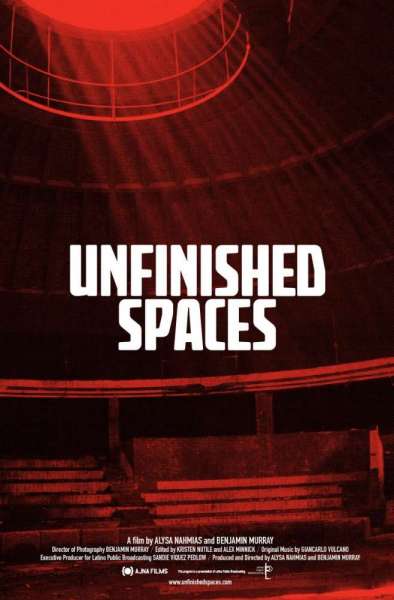
If you like this film, let us know!
Released in USA 9 june 2011
Length 1h26
OriginUSA
Genres Documentary
Themes Films about education, Seafaring films, Transport films, Documentary films about architecture
Rating77%










Unfinished Spaces is a 2011 documentary film about the revolutionary design of the National Art Schools (Cuba). The film tells the dramatic story of the art schools from their founding by Fidel Castro and Che Guevara to their eventual abandonment and fall into ruin and recent efforts to restore them.
The three visionary architects Ricardo Porro, Roberto Gottardi, and Vittorio Garatti are interviewed on camera. They talk about the intense atmosphere of revolutionary Cuba and how they strove to create an entirely new language of architecture, one without precedent. They also speak about why their design fell into disfavor and how the complex was mostly abandoned, uncompleted.
As the film shows, parts of the schools are in ruins while other parts are used today by young dancers and artists. These schools are on the watch list of the World Monuments Fund, and efforts to restore the abandoned buildings are being explored.
Unfinished Spaces (release date: 2011) was produced by Alysa Nahmias and Benjamin Murray, young filmmakers who became obsessed with the story of the schools' rise and downfall. The film received several important grants and had its World Premiere at the Los Angeles Film Festival in June 2011. The film was favorably reviewed in Hollywood Reporter and LA Weekly.
Comments
Leave comment :
Suggestions of similar film to Unfinished Spaces
There are 8974 with the same cinematographic genres, 7752 films with the same themes (including 0 films with the same 4 themes than Unfinished Spaces), to have finally 70 suggestions of similar films.If you liked Unfinished Spaces, you will probably like those similar films :

Our School (2007)
, 2h11Genres Documentary
Themes Films about education, Seafaring films, Transport films
Rating68%





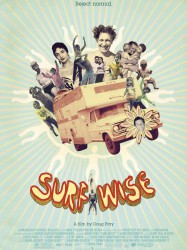
Surfwise (2007)
, 1h33Directed by Doug Pray
Origin USA
Genres Documentary
Themes Films about education, Films about children, Films about families, Seafaring films, Sports films, Transport films, Surfing films, Documentary films about sports, Documentaire sur une personnalité
Rating70%





En 1956, le Docteur Paskowitz avait tout réussi : médecin renommé, sportif accompli, il faisait même ses débuts dans la politique locale à Hawaï. Bref, c'était le parfait exemple du rêve américain. Ou du moins le croyait-il, jusqu'à LA révélation...

The Beginning or the End (1947)
, 1h52Directed by Norman Taurog
Origin USA
Genres Drama, War, Biography, Documentary, Historical
Themes Seafaring films, Transport films, Aviation films, Political films, Arme nucléaire
Actors Brian Donlevy, Hume Cronyn, Robert Walker, Audrey Totter, Tom Drake, Hurd Hatfield
Rating65%





In 1945, physicist and atomic scientist Dr. J. Robert Oppenheimer (Hume Cronyn) praises the discovery of atomic energy, but also warns of its dangers. American scientists such as Matt Cochran (Tom Drake), working under the guidance of Dr. Enrico Fermi (Joseph Calleia) and Dr. Marré (Victor Francen), have split the atom, and essentially beaten the Germans in the race to create an atomic bomb. With the assistance of Albert Einstein (Ludwig Stössel), they inform President Franklin D. Roosevelt (Godfrey Tearle) that a monumental discovery has been made.
 , 1h33
, 1h33Directed by Jacques-Yves Cousteau, Philippe Cousteau, Marshall Flaum
Origin France
Genres Documentary
Themes Environmental films, Seafaring films, Transport films, Documentary films about environmental issues, Documentary films about nature
Rating71%





In December 1975 The Cousteau Society starts a four months expedition through Antarctica. The expedition also relies on Monaco's Oceanographic Museum and on La Rochelle Natural History Museum, that latter represented on board by Raymond Duguy (1927 - 2012), its by time director.
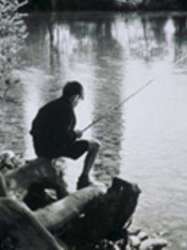
About a River (1955)
, 25minutesDirected by Georges Franju
Origin France
Genres Documentary
Themes Seafaring films, Transport films
Le film expose les différents aspects de la pêche au saumon atlantique.

The Endless Summer (1966)
, 1h35Directed by Bruce Brown
Origin USA
Genres Documentary
Themes Seafaring films, Sports films, Transport films, Surfing films, Documentary films about sports, Documentaire de voyage
Actors Bruce Brown
Rating75%





Le réalisateur Bruce Brown suit deux surfeurs, Mike Hynson et Robert August dans un voyage autour du monde. Malgré le climat agréable de leur Californie natale, les courants froids rendent les plages locales inhospitalières durant l'hiver. C'est pourquoi, aux côtés de Rodney Sumpter et de Nat Young, ils décident de voyager vers les côtes de l'Australie, de la Nouvelle-Zélande, de l'Afrique du Sud, de Tahiti et d’Hawaï, en quête de nouveaux spots de surf - et de la vague parfaite. Ils en profitent pour introduire les locaux à ce nouveau sport. De nombreux surfeurs connus apparaissent durant leurs aventures, Miki Dora, Phil Edwards et Butch Van Artsdalen.
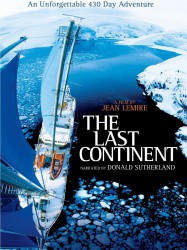
The Last Continent (2007)
Genres Documentary
Themes Environmental films, Seafaring films, Transport films, Documentary films about environmental issues
Actors Donald Sutherland
Rating67%





À bord du voilier Sedna IV, Jean Lemire et son équipe se sont engagés pour une ultime mission. Une mission extrême, 430 jours d'expédition et un hivernage en Antartique, totalement isolés, au bout du monde.Dans la foulée des grands explorateurs d'hier, ils ont repousser les limites pour livrer aux spectateurs une épopée unique, motivé par une formidable quêtes d'aventures, de découvertes et de rêves...
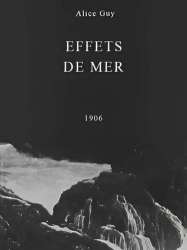
Ocean Studies (1906)
, 2minutesDirected by Alice Guy-Blaché
Origin France
Genres Documentary
Themes Seafaring films, Poésie, Transport films
Rating51%





Vues de vagues s’affalant sur des rochers côtiers.

Con il cuore fermo Sicilia (1965)
Directed by Gianfranco Mingozzi
Genres Documentary
Themes Seafaring films, Transport films
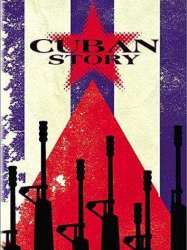 , 50minutes
, 50minutesOrigin USA
Genres Documentary
Themes Seafaring films, Transport films, Political films
Actors Errol Flynn
Rating61%





 Connection
Connection